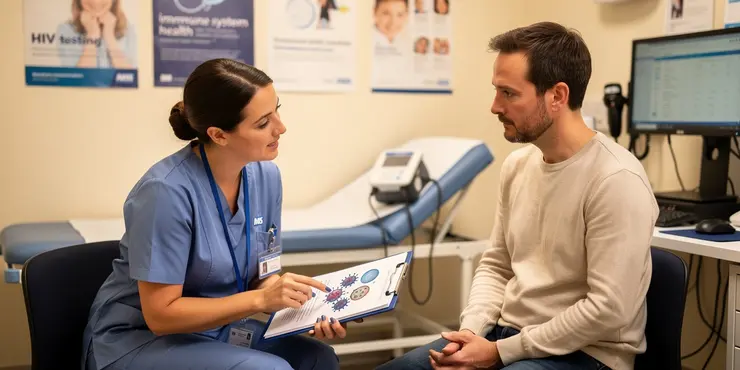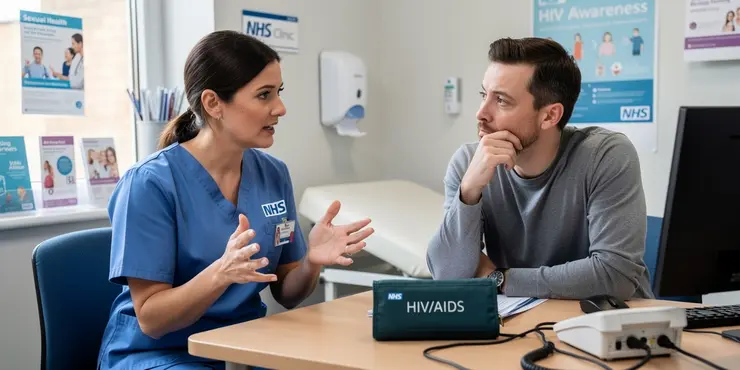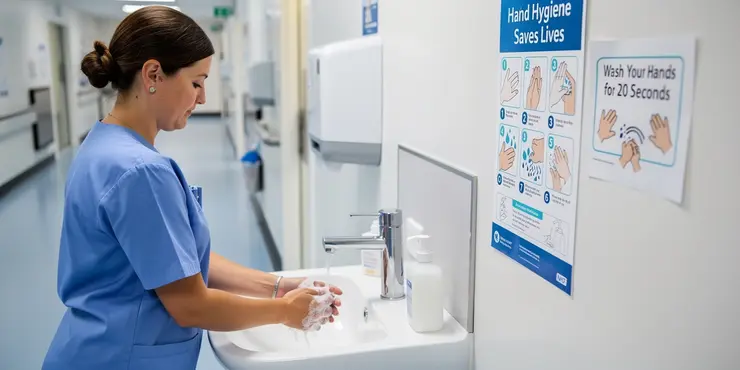
Find Help
More Items From Ergsy search
-

What are opportunistic infections?
Relevance: 100%
-

Mycobacterium chimaera infection
Relevance: 41%
-

Are E. coli infections contagious?
Relevance: 40%
-

What is the difference between HIV and AIDS?
Relevance: 39%
-

Are there symptoms of an HPV infection?
Relevance: 39%
-

Do antibiotics work on viral infections?
Relevance: 39%
-

Chest infection: what should I do?
Relevance: 39%
-

Can E. coli infections be treated?
Relevance: 39%
-

How does HIV affect the immune system?
Relevance: 38%
-

How is E. coli infection diagnosed?
Relevance: 38%
-

Avoiding infections with urinary incontinence
Relevance: 38%
-

What is Chikungunya virus infection?
Relevance: 37%
-

Can animals be infected with H3N2?
Relevance: 37%
-

Self care: Treating ear infections
Relevance: 37%
-

Can a stoma bag cause infections?
Relevance: 37%
-
Can ear infections lead to tinnitus?
Relevance: 37%
-

Podiatrist Fungal feet - fungal infection of skin and nails and how to prevent fungal infection in feet
Relevance: 36%
-

What are the symptoms of Nipah Virus infection?
Relevance: 36%
-

What is AIDS?
Relevance: 36%
-

How do people get infected with E. coli?
Relevance: 36%
-

Dorothy's Story (Falls/Chest Infection)
Relevance: 36%
-

How can E. coli infections be prevented?
Relevance: 36%
-

Sexually transmitted infections STIs
Relevance: 36%
-

What is HIV / AIDS?
Relevance: 35%
-

Who is at risk for severe Chikungunya infection?
Relevance: 35%
-

How is Chikungunya virus infection diagnosed?
Relevance: 35%
-

Can Chikungunya virus infection be treated?
Relevance: 35%
-

What populations are at higher risk for E. coli infections?
Relevance: 35%
-

How soon do symptoms appear after infection?
Relevance: 35%
-

Antibiotics and You: An introduction to antibiotic resistant infections
Relevance: 34%
-

What role do infections play in chronic fatigue syndrome?
Relevance: 34%
-

How can I prevent norovirus infection?
Relevance: 33%
-

Can air physiotherapy prevent respiratory infections?
Relevance: 33%
-

Are there any long-term effects of Chikungunya infection?
Relevance: 33%
-
Can bacterial infections be transmitted through blood transfusion?
Relevance: 33%
-

Can gonorrhoea infect areas other than the genital organs?
Relevance: 32%
-

Can men in the UK transmit Zika virus if infected?
Relevance: 32%
-

What is the mortality rate of Nipah Virus infection?
Relevance: 32%
-

What should someone do if they suspect Nipah Virus infection?
Relevance: 32%
-

What preventive measures can reduce the risk of Nipah Virus infection?
Relevance: 29%
What Are Opportunistic Infections?
Opportunistic infections are illnesses that occur more frequently and are more severe in individuals with weakened immune systems compared to those with healthy immune systems. These infections take advantage of the body's reduced ability to fight off disease. Common causes of immune system suppression include conditions such as HIV/AIDS, cancer treatments, organ transplantation, and the use of immunosuppressive medications.
Common Types of Opportunistic Infections
There are several types of opportunistic infections, each caused by different microorganisms such as bacteria, viruses, fungi, and parasites. Some of the most common opportunistic infections include Pneumocystis pneumonia (PCP), Kaposi's sarcoma, and cytomegalovirus (CMV) infection. These infections can affect various parts of the body, leading to serious health complications.
Pneumocystis pneumonia is a fungal infection of the lungs that can cause severe respiratory problems. Kaposi's sarcoma, a type of cancer, causes lesions in the skin, lymph nodes, and internal organs. Cytomegalovirus infection can affect the eyes, resulting in vision impairment or blindness if not treated promptly.
Causes and Risk Factors
Opportunistic infections occur when the immune system is unable to effectively defend the body against pathogens. Various factors can weaken the immune system, making individuals more susceptible to these infections. People with HIV/AIDS are at particularly high risk because the virus specifically targets and destroys critical immune cells.
Other risk factors include chronic diseases such as diabetes, the use of corticosteroids, chemotherapy, and radiation therapy in cancer treatment. Organ transplant recipients are also at increased risk due to the immunosuppressive drugs required to prevent organ rejection.
Prevention and Management
Preventing opportunistic infections involves a combination of lifestyle adjustments, vaccination, and prophylactic medications. Maintaining a healthy lifestyle, including a balanced diet and regular exercise, can help support the immune system. Vaccinations against common pathogens can reduce the risk of specific infections.
For individuals at high risk, doctors may prescribe medications to prevent certain infections before they occur, a strategy known as prophylaxis. For those already infected, prompt medical treatment is crucial to manage symptoms and prevent complications.
Conclusion
Opportunistic infections pose significant challenges for individuals with weakened immune systems. Understanding the causes, prevention strategies, and management options can help mitigate the risks associated with these infections. Anyone at risk should work closely with healthcare providers to develop an appropriate plan for prevention and management.
What Are Opportunistic Infections?
Opportunistic infections are sicknesses that happen more often and are worse for people whose bodies can't fight germs well. This happens to people who are very sick or are taking special medicines. People with illnesses like HIV/AIDS, cancer, or who had an organ replaced have weaker protection against germs.
Common Types of Opportunistic Infections
There are different kinds of opportunistic infections caused by germs like bacteria and viruses. Some common ones are Pneumocystis pneumonia (PCP), Kaposi's sarcoma, and cytomegalovirus (CMV) infection.
Pneumocystis pneumonia is a lung infection that makes it hard to breathe. Kaposi's sarcoma is a special kind of cancer that makes spots on the skin and inside the body. Cytomegalovirus infection can hurt the eyes and might make someone lose their sight if not treated.
Causes and Risk Factors
Opportunistic infections happen when the body can't fight off bad germs. Many things can make the body weak like HIV/AIDS because this virus destroys the cells that help us stay healthy.
People with long-lasting illnesses like diabetes, or those who take strong medicines like for cancer, are more likely to get these infections. People with a new organ in their body are also more likely to get sick because of the special medicines they take.
Prevention and Management
We can try to stop opportunistic infections by living healthily, getting shots, and taking safety medicines. Eating good food and exercising helps our bodies stay strong. Getting vaccines can stop some infections.
Doctors can give medicines to people who might get sick to stop infections from happening. If someone does get an infection, seeing a doctor quickly is important to feel better and stop more problems.
Conclusion
Opportunistic infections are tough for people who don't have strong bodies to fight germs. Knowing how they happen and how to stop them helps. People should talk with their doctors to stay safe and healthy.
Frequently Asked Questions
Useful Links
This website offers general information and is not a substitute for professional advice.
Always seek guidance from qualified professionals.
If you have any medical concerns or need urgent help, contact a healthcare professional or emergency services immediately.
Some of this content was generated with AI assistance. We’ve done our best to keep it accurate, helpful, and human-friendly.
- Ergsy carfully checks the information in the videos we provide here.
- Videos shown by Youtube after a video has completed, have NOT been reviewed by ERGSY.
- To view, click the arrow in centre of video.
- Most of the videos you find here will have subtitles and/or closed captions available.
- You may need to turn these on, and choose your preferred language.
- Go to the video you'd like to watch.
- If closed captions (CC) are available, settings will be visible on the bottom right of the video player.
- To turn on Captions, click settings .
- To turn off Captions, click settings again.
More Items From Ergsy search
-

What are opportunistic infections?
Relevance: 100%
-

Mycobacterium chimaera infection
Relevance: 41%
-

Are E. coli infections contagious?
Relevance: 40%
-

What is the difference between HIV and AIDS?
Relevance: 39%
-

Are there symptoms of an HPV infection?
Relevance: 39%
-

Do antibiotics work on viral infections?
Relevance: 39%
-

Chest infection: what should I do?
Relevance: 39%
-

Can E. coli infections be treated?
Relevance: 39%
-

How does HIV affect the immune system?
Relevance: 38%
-

How is E. coli infection diagnosed?
Relevance: 38%
-

Avoiding infections with urinary incontinence
Relevance: 38%
-

What is Chikungunya virus infection?
Relevance: 37%
-

Can animals be infected with H3N2?
Relevance: 37%
-

Self care: Treating ear infections
Relevance: 37%
-

Can a stoma bag cause infections?
Relevance: 37%
-
Can ear infections lead to tinnitus?
Relevance: 37%
-

Podiatrist Fungal feet - fungal infection of skin and nails and how to prevent fungal infection in feet
Relevance: 36%
-

What are the symptoms of Nipah Virus infection?
Relevance: 36%
-

What is AIDS?
Relevance: 36%
-

How do people get infected with E. coli?
Relevance: 36%
-

Dorothy's Story (Falls/Chest Infection)
Relevance: 36%
-

How can E. coli infections be prevented?
Relevance: 36%
-

Sexually transmitted infections STIs
Relevance: 36%
-

What is HIV / AIDS?
Relevance: 35%
-

Who is at risk for severe Chikungunya infection?
Relevance: 35%
-

How is Chikungunya virus infection diagnosed?
Relevance: 35%
-

Can Chikungunya virus infection be treated?
Relevance: 35%
-

What populations are at higher risk for E. coli infections?
Relevance: 35%
-

How soon do symptoms appear after infection?
Relevance: 35%
-

Antibiotics and You: An introduction to antibiotic resistant infections
Relevance: 34%
-

What role do infections play in chronic fatigue syndrome?
Relevance: 34%
-

How can I prevent norovirus infection?
Relevance: 33%
-

Can air physiotherapy prevent respiratory infections?
Relevance: 33%
-

Are there any long-term effects of Chikungunya infection?
Relevance: 33%
-
Can bacterial infections be transmitted through blood transfusion?
Relevance: 33%
-

Can gonorrhoea infect areas other than the genital organs?
Relevance: 32%
-

Can men in the UK transmit Zika virus if infected?
Relevance: 32%
-

What is the mortality rate of Nipah Virus infection?
Relevance: 32%
-

What should someone do if they suspect Nipah Virus infection?
Relevance: 32%
-

What preventive measures can reduce the risk of Nipah Virus infection?
Relevance: 29%


